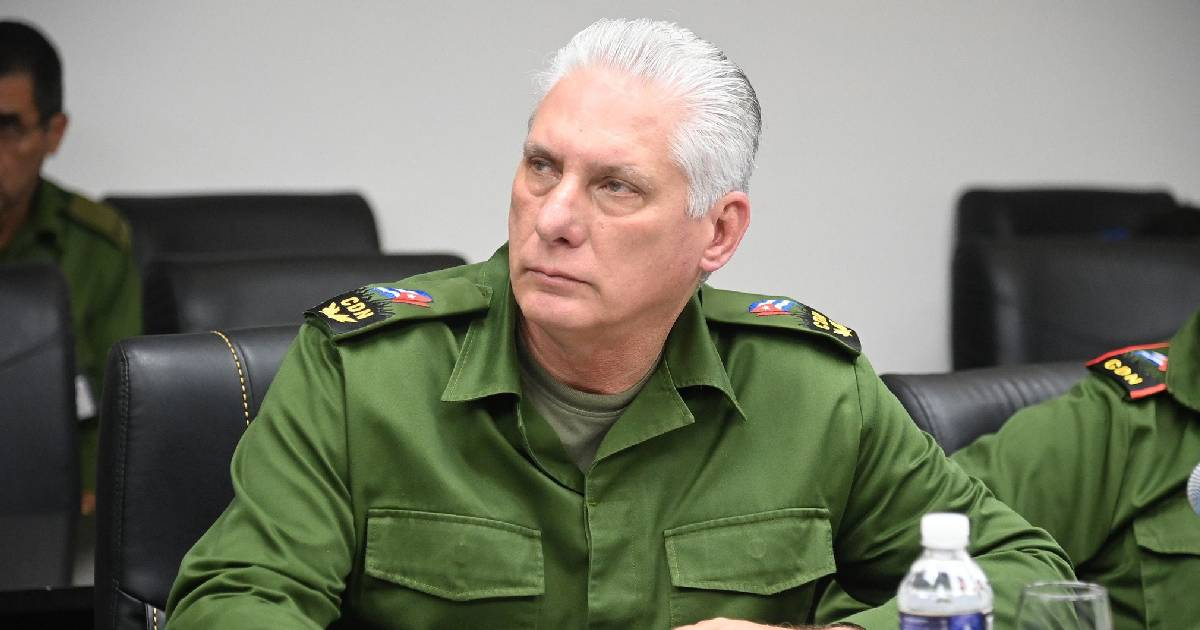
Related videos:
The Cuban ruler, Miguel Díaz-Canel, spoke this Saturday about the recent decision by the United States government to reestablish restrictive measures against the island, warning that they could be a prelude to new sanctions.
Díaz-Canel noted that these measures, which affect financial and commercial transactions with Cuban state entities, are "another abuse, wrapped in lies, to justify the criminal blockade of the U.S. government against our people."
"It is not surprising the criminal measures announced to threaten #Cuba, a country that does not have a single measure in force against the U.S. How can anyone claim to want to help the well-being of Cubans with new suffocating measures?" stated the appointee of Raúl Castro in a message shared on social media.
He also emphasized that the Cuban people will resist these attempts at pressure and responded with a message of defiance, highlighting that the only possible response will be victory.
“They may possibly be a prelude to other announcements that the team responsible for the #Cuba issue has been preparing since 2017 to achieve their failed objective of subjugating us,” he added.
And he continued his message by saying that “they will receive condemnation from all Cubans who love their homeland, universal isolation, and responsibility for the harm caused to a noble people who do not deserve such mistreatment but will not kneel. Our response will be victory”.
At the same time, the Ministry of Foreign Affairs of Cuba (Minrex) issued a statement titled "Firmness and Dignity in the Face of Aggression," in which it condemned the recent measures announced by the United States government against the island.
The document describes these actions as an attempt to destabilize and subjugate the Cuban people through the intensification of the economic, commercial, and financial embargo.
The statement emphasizes that, despite the adversities imposed by these policies, Cuba will maintain its stance of resistance and dignity, reaffirming its commitment to national sovereignty and the right to self-determination.
The Minrex also called on the international community to condemn these actions and stand in solidarity with Cuba in its fight against the blockade and external aggression.
On Friday, the United States government reactivated Title III of the Helms-Burton Act, allowing U.S. citizens to file lawsuits for properties confiscated by the Cuban regime.
Additionally, it expanded the "Cuba Restricted List," adding entities linked to the Cuban military and security apparatus, such as the company Orbit S.A., which is responsible for processing remittances for the benefit of the Cuban military forces.
These actions are part of a firmer policy toward Cuba, announced by the Trump administration, which also keeps the island on the list of state sponsors of terrorism.
The Helms-Burton Law, enacted in 1996, codifies the economic sanctions against Cuba and establishes conditions for their removal.
Title III of this law allows U.S. citizens, including those who were Cuban citizens at the time of expropriation and later naturalized in the U.S., to sue in U.S. courts individuals or entities that "traffic" in properties confiscated by the Cuban government after 1959.
Since its enactment, the application of Title III had been suspended by successive U.S. administrations to avoid diplomatic conflicts with allies whose citizens or companies could be affected.
However, in 2019, the Trump administration decided to activate this title for the first time, allowing for the filing of lawsuits.
Frequently Asked Questions about the Recent United States Measures toward Cuba
What is Díaz-Canel's stance on the new sanctions from the United States?
Miguel Díaz-Canel described the recent measures from the United States as an "abuse" and an attempt at destabilization. He criticized the reestablishment of restrictive policies and stated that these sanctions are part of a "cruel economic war" against Cuba.
What implications does the reactivation of Title III of the Helms-Burton Act have for Cuba?
The reactivation of Title III of the Helms-Burton Act allows U.S. citizens to sue entities that "traffic" in properties confiscated by the Cuban regime after 1959. This intensifies the economic embargo and creates diplomatic tensions with countries whose citizens could be affected.
How has the Ministry of Foreign Affairs of Cuba reacted to these sanctions?
The Ministry of Foreign Affairs of Cuba issued a statement titled "Firmness and Dignity in the Face of Abuse," in which it condemned the measures taken by the United States and called on the international community to stand in solidarity with Cuba in its fight against the blockade and external aggressions.
Which Cuban entities have been affected by the new restrictions from the United States?
Entities linked to the Cuban military and security apparatus, such as the company Orbit S.A., have been added to the "Cuba Restricted List." This company is responsible for processing remittances for the benefit of the Cuban military forces, complicating financial and commercial transactions.
Filed under: